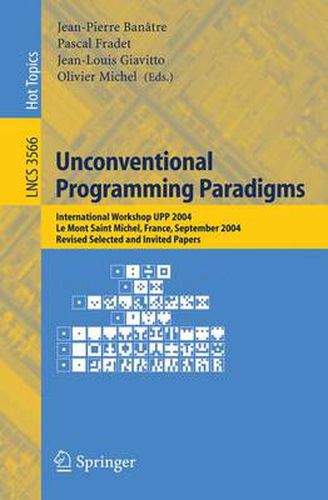Readings Newsletter
Become a Readings Member to make your shopping experience even easier.
Sign in or sign up for free!
You’re not far away from qualifying for FREE standard shipping within Australia
You’ve qualified for FREE standard shipping within Australia
The cart is loading…






This title is printed to order. This book may have been self-published. If so, we cannot guarantee the quality of the content. In the main most books will have gone through the editing process however some may not. We therefore suggest that you be aware of this before ordering this book. If in doubt check either the author or publisher’s details as we are unable to accept any returns unless they are faulty. Please contact us if you have any questions.
Nowadays, developers have to face the proliferation of hardware and software environments, the increasing demands of the users, the growing number of p- grams and the sharing of information, competences and services thanks to the generalization ofdatabasesandcommunication networks. Aprogramisnomore a monolithic entity conceived, produced and ?nalized before being used. A p- gram is now seen as an open and adaptive frame, which, for example, can - namically incorporate services not foreseen by the initial designer. These new needs call for new control structures and program interactions. Unconventionalapproachestoprogramminghavelongbeendevelopedinv- iousnichesandconstituteareservoirofalternativewaystofacetheprogramming languages crisis. New models of programming (e. g. , bio-inspired computing, - ti?cialchemistry,amorphouscomputing,… )arealsocurrentlyexperiencinga renewed period of growth as they face speci?c needs and new application - mains. These approaches provide new abstractions and notations or develop new ways of interacting with programs. They are implemented by embedding new sophisticated data structures in a classical programming model (API), by extending an existing language with new constructs (to handle concurrency, - ceptions, open environments, … ), by conceiving new software life cycles and program executions (aspect weaving, run-time compilation) or by relying on an entire new paradigm to specify a computation. They are inspired by theoretical considerations (e. g. , topological, algebraic or logical foundations), driven by the domain at hand (domain-speci?c languages like PostScript, musical notation, animation, signal processing, etc. ) or by metaphors taken from various areas (quantum computing, computing with molecules, information processing in - ological tissues, problem solving from nature, ethological and social modeling).
$9.00 standard shipping within Australia
FREE standard shipping within Australia for orders over $100.00
Express & International shipping calculated at checkout
This title is printed to order. This book may have been self-published. If so, we cannot guarantee the quality of the content. In the main most books will have gone through the editing process however some may not. We therefore suggest that you be aware of this before ordering this book. If in doubt check either the author or publisher’s details as we are unable to accept any returns unless they are faulty. Please contact us if you have any questions.
Nowadays, developers have to face the proliferation of hardware and software environments, the increasing demands of the users, the growing number of p- grams and the sharing of information, competences and services thanks to the generalization ofdatabasesandcommunication networks. Aprogramisnomore a monolithic entity conceived, produced and ?nalized before being used. A p- gram is now seen as an open and adaptive frame, which, for example, can - namically incorporate services not foreseen by the initial designer. These new needs call for new control structures and program interactions. Unconventionalapproachestoprogramminghavelongbeendevelopedinv- iousnichesandconstituteareservoirofalternativewaystofacetheprogramming languages crisis. New models of programming (e. g. , bio-inspired computing, - ti?cialchemistry,amorphouscomputing,… )arealsocurrentlyexperiencinga renewed period of growth as they face speci?c needs and new application - mains. These approaches provide new abstractions and notations or develop new ways of interacting with programs. They are implemented by embedding new sophisticated data structures in a classical programming model (API), by extending an existing language with new constructs (to handle concurrency, - ceptions, open environments, … ), by conceiving new software life cycles and program executions (aspect weaving, run-time compilation) or by relying on an entire new paradigm to specify a computation. They are inspired by theoretical considerations (e. g. , topological, algebraic or logical foundations), driven by the domain at hand (domain-speci?c languages like PostScript, musical notation, animation, signal processing, etc. ) or by metaphors taken from various areas (quantum computing, computing with molecules, information processing in - ological tissues, problem solving from nature, ethological and social modeling).